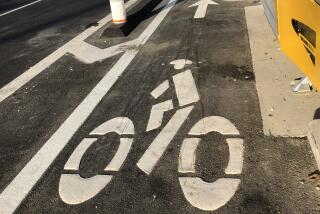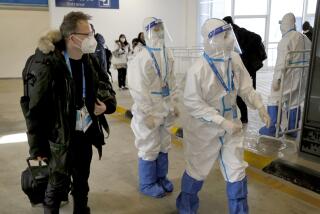CHINA: THE GIANT AWAKENS : POSTCARDS from China : Bye-Bye Bicycle?
The toasters on wheels are now as familiar on the streets of Beijing as the bicycles they threaten: bright yellow, high-roofed, thin-springed mini-cabs. Six miles for a buck. No extra charge for the jounces.
When I lived in Beijing 12 years ago, taxis were few and far between, and the light traffic was one of few creature comforts. The bike was king then, but now the cabs, together with the vastly expanded traffic in company cars and trucks, have changed the face and feel of the city.
There are still 7 million bicycles in Beijing, but they are beginning to look like two-wheeler buffaloes about to be overwhelmed by toot-tooting iron horses.
Beijing is building roads at a remarkable pace. There’s a spanking new tollway from the airport, and a series of ring roads--all of them new in the past few years. Still, in peak hours Beijing’s downtown jam makes Rome seem empty.
The traffic police have a big new high-rise headquarters within siren-hail of one of the new rings. There, crisp and polite in his force’s new green summer uniform, assistant director Yu Chunquan dazzled me with statistics. (In my day, even the weather forecasts were secret.)
“Beijing has opened 2,000 kilometers of new roads in the past five years, but the number of vehicles keep growing. As a result, we have the same traffic problem as any big city,” Yu said. The good news is that traffic deaths have declined: 497 last year from a peak of 759 in 1985.
In the last five years, 340,000 new vehicles hit capital streets. At the end of 1992, there were 610,000 vehicles registered in Beijing, Yu said. He expects 100,000 more by the end of 1993.
As for the cabs: “In 1979 there were three or four taxi companies. By 1988 there were 140. There are now 900 companies and 50,000 taxis,” he said.
Mired one afternoon in a sweltering mini-cab somewhere between the Third Ring Road, which is being reconstructed, and the unfinished Fourth Ring Road, Zhang Fengshou reflected on the wonders of Beijing’s transportation system.
“I’ve been a construction supervisor since 1963, and my salary is now 360 yuan a month. I borrowed money from friends to buy this taxi and I think I can pay it back in a year because I think I can make 2,000 yuan a month driving in my spare time.”
More to Read
Sign up for Essential California
The most important California stories and recommendations in your inbox every morning.
You may occasionally receive promotional content from the Los Angeles Times.










